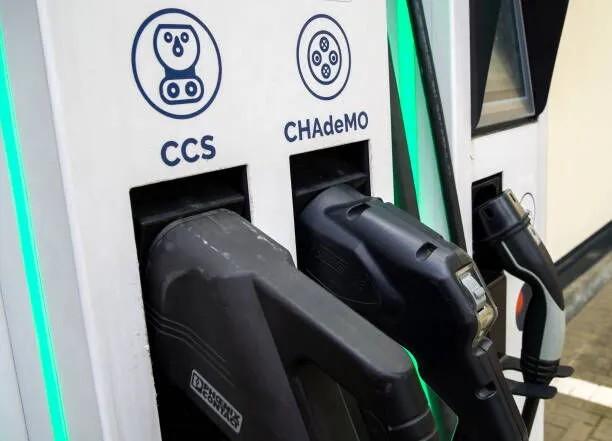Notifications

8 minutes, 32 seconds
-15 Views 0 Comments 0 Likes 0 Reviews

CHAdeMO vs. CCS: Understanding the Key Differences in EV Charging Standards
As a trusted China EV charger manufacturer, Topper Company delivers dependable electric vehicle charging station equipment and comprehensive solutions.
As the electric vehicle (EV) market continues to expand, two key standards for DC fast charging have emerged: CHAdeMO and CCS. Both of these systems aim to streamline and enhance the charging process, but they have distinct differences that may make one more suitable than the other for specific use cases. In this article, we’ll explore the key features, advantages, and disadvantages of both CHAdeMO and CCS to help you understand which might be better suited for your EV charging needs.
CHAdeMO, which stands for CHArge de MOve, is a DC fast-charging standard developed in Japan. Introduced in 2010, it was pioneered by Nissan in partnership with other Japanese companies. Over the years, CHAdeMO has become a reliable and widely adopted charging system, especially in Japan.
Fast DC Charging: CHAdeMO delivers high-voltage direct current to the vehicle’s battery, enabling faster charging than traditional AC systems.
Power Ratings: Charging stations using CHAdeMO are typically rated at 50 kW or higher, allowing most EVs to charge fully in about an hour.
Bidirectional Charging: One of the standout features of CHAdeMO is its support for bidirectional charging, allowing electricity to flow not only from the charger to the vehicle but also in reverse—from the vehicle to a home or even the grid. This feature is essential for vehicle-to-grid (V2G) and vehicle-to-home (V2H) applications.
Connector Design: CHAdeMO connectors are distinct from Type 1 and Type 2 AC connectors used in Europe and feature additional pins for high-speed DC charging.
CHAdeMO is widely deployed in Japan and has significant presence in Asia. However, its adoption in Europe and North America has been slower, where newer charging standards like CCS have gained more traction.
The Combined Charging System (CCS) is an integrated, standardized charging protocol designed to simplify the charging process for EVs. Unlike CHAdeMO, which only supports DC fast charging, CCS enables both AC and DC charging through a single connector.
Integrated Design: CCS combines the traditional Type 1 (for North America) or Type 2 (for Europe) AC connector with two additional pins for DC fast charging, allowing the same port to handle both types of charging.
Power Ratings: CCS chargers support a wide range of power outputs, from standard home charging levels to ultra-fast chargers capable of delivering up to 350 kW, which can charge EVs significantly faster.
Widespread Adoption: CCS is the dominant standard in Europe and North America, with strong support from major automakers like Volkswagen, BMW, and Tesla (in Europe), making it the standard of choice in these regions.
Future-Proof: With its high power capacity and compatibility with ultra-fast charging, CCS is well-equipped for the future of electric vehicles, especially as larger battery capacities are introduced.
CHAdeMO: Typically supports charging speeds up to 50 kW, with newer versions like CHAdeMO 3.0 capable of handling up to 400 kW. However, this higher power rating is not yet widespread.
CCS: Capable of delivering over 350 kW, making it more suitable for ultra-fast charging applications.
CHAdeMO: Uses a separate connector for DC fast charging, meaning vehicles require two ports—one for AC and another for DC charging.
CCS: Integrates both AC and DC charging into a single connector, offering more convenience and reducing the need for multiple ports.
CHAdeMO: Strongly leads in bidirectional charging capabilities, with support for V2G and V2H applications already in place.
CCS: While it is gradually introducing bidirectional charging capabilities, it currently lags behind CHAdeMO in this regard.
CHAdeMO: Predominantly used in Japan and parts of Asia, but its adoption in Europe and North America is limited as CCS has gained momentum.
CCS: The dominant charging standard in Europe and North America, rapidly becoming the global standard for public and home charging stations.
CHAdeMO: Offers limited compatibility with newer EVs, especially in regions outside Japan, where automakers are moving toward CCS.
CCS: Universally compatible with modern EVs in Europe and North America, thanks to its integration with Type 1 and Type 2 connectors.
Proven Reliability: With over a decade of use, CHAdeMO is a well-established and trusted standard for DC fast charging.
Bidirectional Charging: CHAdeMO’s support for V2G and V2H capabilities makes it an ideal option for those interested in energy storage or grid integration.
Simplicity: CHAdeMO chargers are simple and straightforward to use, offering a user-friendly charging experience.
Integrated Design: A single connector for both AC and DC charging simplifies vehicle design and reduces the complexity of charging infrastructure.
Scalability: CCS chargers are versatile, supporting a wide range of power outputs, from home charging to ultra-fast DC charging.
Global Standardization: With broad adoption in Europe and North America, CCS provides a unified, cross-regional charging experience.
Future-Ready: The system’s ability to support ultra-fast charging makes it ideal for next-generation EVs with larger battery capacities.
The choice between CHAdeMO and CCS depends on several factors, including regional preferences, vehicle compatibility, and charging speed requirements.
Choose CHAdeMO if: You are in Japan, have an EV with bidirectional charging capabilities, or are interested in vehicle-to-grid or vehicle-to-home applications.
Choose CCS if: You prioritize fast charging, need compatibility with a wide range of vehicles, and live in Europe or North America, where CCS is the dominant standard.
The competition between CHAdeMO and CCS is a reflection of the rapidly evolving EV market. While CHAdeMO continues to innovate with features like bidirectional charging, CCS has emerged as the global standard due to its integrated design and widespread adoption by automakers and governments.
Looking ahead, the EV industry may eventually consolidate around a single charging standard as automakers and governments push for interoperability. For now, both CHAdeMO and CCS continue to play essential roles in driving the adoption of electric vehicles and advancing the transition to sustainable transportation.Know more about Google SEO Directory
China EV Chargers EV Charger Manufacturer EV Charging Solutions

